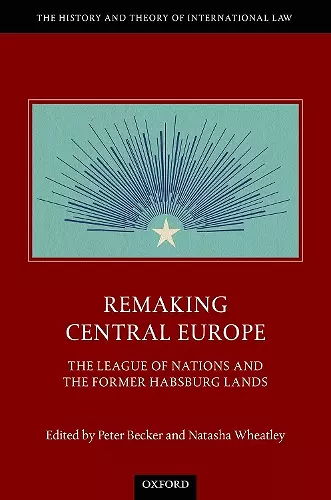Remaking Central Europe
The League of Nations and the Former Habsburg Lands
Peter Becker editor Natasha Wheatley editor
Format:Hardback
Publisher:Oxford University Press
Published:29th Dec '20
Currently unavailable, and unfortunately no date known when it will be back

Over the last two decades, the "new international order" of 1919 has grown into an expansive new area of research across multiple disciplines. With the League of Nations at its heart, the interwar settlement's innovations in international organizations, international law, and many other areas shaped the world we know today. This book presents the first study of the relationship between this new international order and the new regional order in Central and Eastern Europe after the collapse of the Habsburg empire. An analysis of the co-implication of these two orders is grounded in four key scholarly interventions: understanding the legacies of empire in international organizations; examining regionalism in the work of interwar international institutions; creating an integrated history of the interwar order in Europe; and testing recent claims of the conceptual connection between nationalism and internationalism. With chapters covering international health, international financial oversight, human trafficking, minority rights, scientific networks, technical expertise, passports, commercial treaties, borders and citizenship, and international policing, this book pioneers a regional approach to international order, and explores the origins of today's global governance in the wake of imperial collapse.
The volume begins with an evaluation of Habsburg histories of internationalism (Glenda Sluga), devotes six chapters to "remaking actors and networks", and seven to "remaking territories and borders". A fine Epilogue (Patricia Clavin) sums up the relationship between the League and Central Europe as "foundational" for that institution, the region, and the world. * William E. Butler, Jus Gentium *
This is a fine collection of historical scholarship in which contributions are always original, well-informed, thoughtful, and well worth reading. * Martyn Housden, Austrian History Yearbook *
Remaking Central Europe, in that sense, might seem to be a (thought-provoking) reversion to a Europocentric interpretation of the League (and international law in general). * Omer Aloni, Journal of the History of International Law *
The volume certainly leaves a lot more nuance in our understanding of the dynamic relationship between the League and the ex-Habsburg lands. * Matthew Stibbe, Slavonic and East European Review *
Had the COVID-19 pandemic of 2020/21 not occurred, Remaking Central Europe would have been an important addition to the canon that has reassessed the League of Nations due to its geographical focus. But its publication at the height of the pandemic adds a poignancy to many of these the chapters and lends a relevance to the book that it would otherwise lack ... a valuable source for anyone interested in the Habsburg Monarchy or the League of Nations. * Benjamin J. Whitlock, European Review of History *
Through 16 essays the reader is able to explore the effects of the collapse of the Habsburg Monarchy and how the international community was compelled to deal with the fallout, developing new techniques in crisis management and specialized international organizations ... a valuable source for anyone interested in the Habsburg Monarchy or the League of Nations. * Benjamin J. Whitlock, University of Aberdeen, European History Review *
ISBN: 9780198854685
Dimensions: 242mm x 165mm x 30mm
Weight: 814g
416 pages